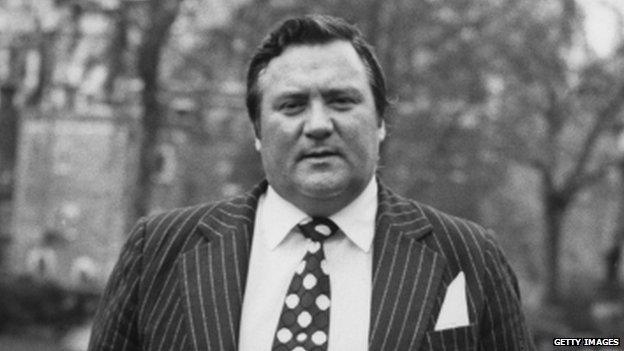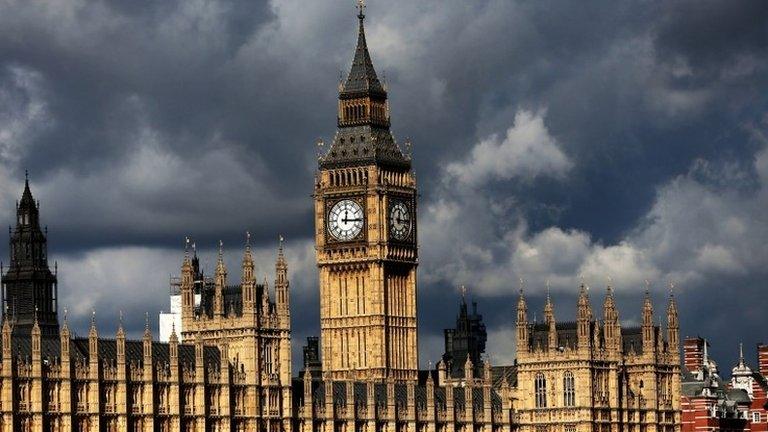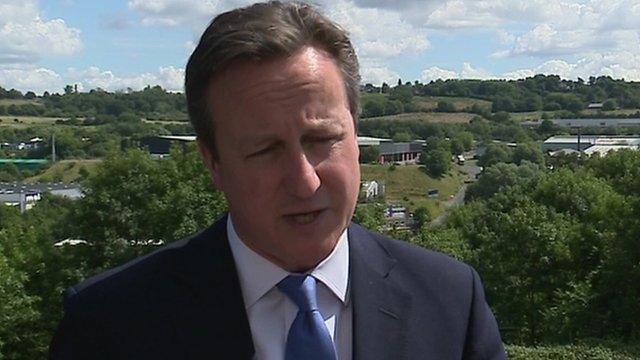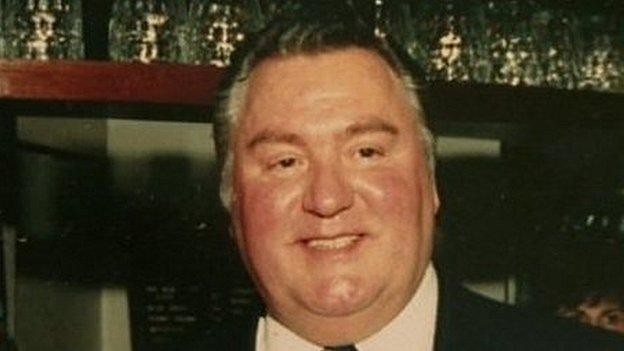Geoffrey Dickens: Tea dances and dossiers
- Published

Geoffrey Dickens served as a Conservative MP from 1979 until his death in 1995
The Today programme's James Naughtie, who was a parliamentary lobby correspondent in the 1970s and 80s, remembers Geoffrey Dickens, the colourful Conservative MP whose dossier on an alleged paedophile network is now the focus of a new inquiry.
No-one can be certain if it was all Geoffrey Dickens's fault that he was not often taken seriously.
He certainly made it difficult for himself, apparently enjoying the persona of parliamentary buffoon while pursuing campaigns on serious questions. One of them, as everyone now knows, on child sexual abuse.
The trouble with twinkle-toed Dickens, who enjoyed telling tales of his exploits at tea dances in Leicester Square, that he never seemed to be quite sure of the difference between the trivial and the serious.
And he had a gift for farce. The press conference at which he announced that he was going to pull out a skeleton from his own closet (in the form of a glamorous partner from one of the tea dances) turned into a famous Westminster occasion when he asked the reporters summoned to hear his confession - if they could hold back the news for a short time.
Unaware that a number had already left the room to phone their news desk, and Mrs Dickens, he admitted he had wanted a little time because he called the press conference and rattled the skeleton in public without having taken the trouble to tell his wife first.
The picture of a cheery bumbler was complete. He was much mocked, and much liked, perhaps because there was an evident authenticity in his working class Tory style, despite his habit at Question Time of sounding as if he was auditioning for an end of the pier show ("Mr Speaker, I want to do a favour for every woman in this country").
But when he started to talk about having assembled a dossier that named names and told a story of paedophile networks in high places, was it not surprising that everyone had a tremor of doubt?
Was it more of a performance than a serious investigation? The question was natural, because Geoffrey was Geoffrey.
Now the dossier is back, though the MP who compiled it never seemed to have kept a copy himself, and long years passed after his initial accusations in the early 1980s with little progress on his part. His naming in the Commons of a former diplomat, Sir Peter Hayman, as a member of the Paedophile Information Exchange (PIE) turned out to be an arrow accurately aimed, but of others we heard nothing.
The reason may have as much to do with the atmosphere of the time as with Dickens himself. There was little of the public concern with paedophilia at the time, almost as if a kind of innocence still attended the subject: many people were simply unwilling to imagine acts that are now discussed openly, and there was no welter of internet comment and campaign on the subject.
Indeed, a sense of disbelief still swirled around the subject. And the trouble was that Dickens, well known as a rent-a-quote MP with a colourful opinion ready to be pulled out of his hat at a moment's notice, was the worst person to dispel it.
He was no methodical campaigner, pursuing his leads and building his case, but a slash and burn man ready to speak about dark conspiracies (he pointed to burglaries at his home and threats against him after speaking about paedophilia), but without a steady hand on the tiller. In the end, it was Geoffrey and people would shrug their shoulders.
Listeners who heard the rebroadcast comments of Tim Fortescue, a former Conservative whip from the Heath-era speaking in a documentary years after, will get the real sense of the times. A chap - it was usually a chap - would come to the whips, and confess his trouble. Sex, money, drink. A brush with the law. You name it. And what happened? They helped out quietly.
That was the tenor of the time. It was the same in all the whips' offices, and everyone knew it.
No doubt it still goes on, but I would venture to say that it is less brazen.
And whether we will ever see the Dickens dossier, who knows? If we did, I imagine we would find that there were some nuggets in there, but quite a lot of fools' gold too.
He was probably the wrong man, though he remained a popular figure, especially in the last illness (he died in 1995) which he handled with great courage. And perhaps his dossier died with him.
Whatever we may make of his credentials as a campaigner, that may be a pity.
- Published1 December 2015

- Published4 February 2015

- Published7 July 2014

- Published3 July 2014
